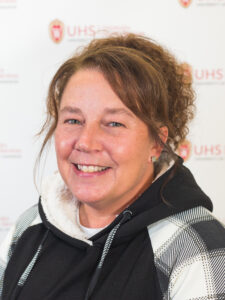UHS Survivor Services provides free, confidential support services to UW–Madison student survivors of sexual assault, dating violence, domestic violence, sexual harassment, sexual exploitation, and/or stalking. For a comprehensive guide to rights and resources for survivors of sexual and relationship violence, read the UW–Madison Sexual Misconduct Resource and Response Guide
How can Survivor Services support you?
Survivor Services Victim Advocacy
Meet with Lea Ann Harris

Meet with Gaonue Vang

RCC Sexual Violence Resource Center
The RCC Sexual Violence Resource Center is not affiliated with UW-Madison.
608-251-7273 (24/7 English helpline)
608-258-2567 (24/7 Spanish helpline)
Click here to learn more about campus advocacy available through the RCC.
General Information
This is an accordion element with a series of buttons that open and close related content panels.
What do advocates do?
- Use self-determination/empowerment approaches
- Provide information, options and resources
- Support immediate needs
- Provide non-clinical validation and emotional support (not formal therapy/counseling services)
- Offer assistance with navigating systems
How do UHS advocates and RCC advocates work together?
Students can choose to receive advocacy services through UHS Survivor Services and/or the Rape Crisis Center. RCC advocates currently respond to all Forensic Nursing Exams at UHS and Meriter Hospital. Some students may prefer to work with a University staff member (UHS advocate) and some may prefer to work with off-campus community resources (RCC advocate). Services are similar, but scheduling offerings vary.
What are the differences between Survivor Services advocates and Survivor Services mental health providers?
Advocates offer non-clinical support services to survivors. Though advocates provide emotional support, education around coping skills, and safety planning, we do not offer therapy. Survivor Services mental health providers offer counseling services specifically for survivors; they can help with processing trauma and creating clinical treatment plans.
Request an outreach event
Survivor Services staff are available to facilitate an outreach event focused on advocacy or survivor resources . Please use the link below to request an event for your group.
uhs.wisc.edu/outreach-request-form/
This is an accordion element with a series of buttons that open and close related content panels.
What services do UHS Survivor Services advocates provide for survivors?
UHS Survivor Survivor Services advocates provides confidential victim advocacy services to all students at UW-Madison. Services include referrals, information about survivor rights, accommodations, accompaniments, consultations, and assistance related to brief intervention.
What are your hours of operation?
Monday-Thursday 8:30am-4:00pm
Friday from 8:30am-12:00pm
RCC advocacy services are available outside of these hours 24/7.
Do I need to meet with an advocate to get connected to medical or mental health services?
No! If you know that you are interested in medical or mental health services, you are able to directly schedule an appointment yourself. Survivor Services medical appointments can be made by calling (608) 265-5600 option 1 for non-emergency appointments or (608) 852-9533 for emergency, same-day, or forensic nursing medical appointments. For Survivor Services mental health appointments, call (608) 265-5600 option 2.
Services
This is an accordion element with a series of buttons that open and close related content panels.
Accommodations
- Academic accommodations for courses
- Housing, workplace, and financial accommodation requests
- Support with speaking to professors, faculty, supervisors, housing, landlords, etc. about needs
Information About Victims’ Rights
- Information about on- and off-campus resources and confidential/non-confidential resources
- Education around campus, legal, medical rights and service options
- Information about restraining orders
Brief Intervention
- Empowering survivors to identify their goals and needs
-
- Teaching & incorporating coping skills
- Safety planning
- Emotional support & validation
This is an accordion element with a series of buttons that open and close related content panels.
Accompaniments
- Accompaniments when reporting to police
- Accompaniments to campus meetings, investigations, and conduct hearings
- Accompaniments to legal meetings, court, etc.
- Emotional support when attending medical appointments
- Note: UHS advocates do not currently respond to Forensic Nurse Exams at UHS or Meriter. The RCC dispatches advocates to be present at these.
- Information & preparation around different processes and appointments
Resources and Referrals
- Direct referrals within UHS Survivor Services (mental health and medical)
- Connecting to community agencies (DAIS, RCC, and identity-specific organizations)
- Outreach and trainings about services are available to students/staff upon request
Consultations
- Coaching for UW-Madison staff about how to support student survivors and responding in a
- trauma-informed manner
- Coaching for friends and family about how to support survivors in their lives
- Support for survivors around how to share or disclose information with others
- Preparing and educating friends & families of survivors about what to expect with campus processes
- Outreach and trainings about resources